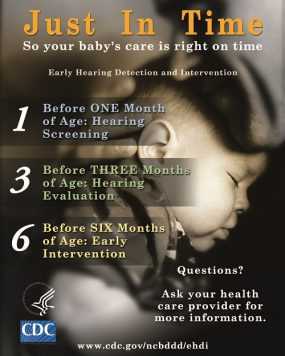Giving Every Child the Gift of Words
While hearing loss can affect a child’s ability to develop language and words, a study recently published in the journal, Pediatrics, entitled “Early Hearing Detection and Vocabulary of Children with Hearing Loss,” found that early diagnosis and intervention for children with hearing loss can help them develop these communication skills. It shows that the children with hearing loss included in this study who were identified and received appropriate help early were more likely to have a much larger vocabulary than children who do not meet the Early Hearing Detection Intervention (EHDI) 1-3-6 guidelines (see side box for description of guidelines).
Vocabulary of Children with Hearing Loss
The study looked at 448 children with hearing loss between 8 and 39 months of age across 12 states, and compared their vocabulary (spoken or using sign language) to the typical vocabulary of a child of the same age. Children with hearing loss who met all three guidelines in the recommended time had much better vocabularies than those who were not identified or did not receive treatment within the 3 and 6 month guidelines, respectively.
Screening newborns for hearing loss within the one month guideline is very successful. In fact, in 2014, 96% of U.S. children were screened for hearing loss no later than 1 month of age1. However, in this Pediatrics study, just over 40% of participating children did not meet the important next steps of having their hearing loss diagnosed by 3 months and beginning intervention by 6 months.
CDC’s National Center on Birth Defects and Developmental Disabilities’ goal is to give every child with hearing loss the same opportunities to succeed as their hearing peers. The recent study shows that children with hearing loss who get hearing screening, diagnosis, and intervention services according to the EHDI 1-3-6 guidelines can have much better vocabulary development.
The EHDI 1-3-6 Guidelines
It is recommended that all babies are screened for hearing loss no later than 1 month of age.
If a baby does not pass the hearing screening, it is important that he or she gets a diagnostic hearing test and evaluation by a hearing specialist as soon as possible, but no later than 3 months of age.
Intervention services are recommended for children diagnosed with hearing loss, beginning as early as possible, but no later than 6 months of age.
Types of Interventions
There are different types of communication options and interventions available for children with hearing loss. With help from healthcare providers and intervention specialists, families are able to select the options that best meet their needs. These are some of the possible options:
• Learning other ways to communicate, such as sign language.
• Technology to help with communication, such as hearing aids and cochlear implants.
• Medicine and surgery to correct some types of hearing loss.
• Family support services, such as support groups.
What Can Be Done
More research is necessary to understand how children with hearing loss can continue to improve their vocabulary development as they grow older. Families, pediatric healthcare providers, and hearing specialists all play a role in getting a child’s hearing assessed in a timely manner and achieving prompt enrollment in intervention, if necessary.
For more information about CDC’s resources, please visit
• The Pediatrics Study
• Facts about Hearing Loss
• Hearing Loss in Children Homepage
• A Parent’s Guide to Hearing Loss
• Educational Materials
• Podcast in English [PODCAST – 10:46 minutes] or in Spanish [PODCAST – 13:11] on Early Hearing Detection and Intervention

- Page last reviewed: July 10, 2017
- Page last updated: July 10, 2017
- Content source:


 ShareCompartir
ShareCompartir
